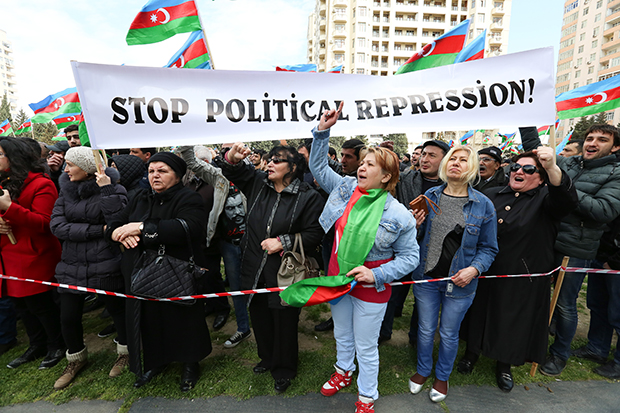[vc_row][vc_column][vc_column_text]

Photo: Aziz Karimov
For Azerbaijan’s president Ilham Aliyev and many other authoritarian leaders across the world, independent journalism and what it represents is bad news. The more irritating leaders find journalists’ work, the harsher consequences are for those reporting. This has been one of the most worrying trends across the world in recent years.
In 2016, there were 38 threats to press freedom reported to the Index on Censorship project Mapping Media Freedom. Journalists critical of the government were tortured and arrested. Internet sites were repeatedly blocked. TV outlets were knocked off the air through revocation of broadcast licences. Newspapers were starved to near bankruptcy and prevented from printing. Online criticism of the country’s hereditary president has been outlawed. Even family members of journalists have been targeted.
“In the last year alone, authorities have either detained, arrested, questioned six journalists and one blogger. Some parliament members have even hinted at introducing legislation that would monitor social media. The relentless pressure on media professionals and citizen journalists in Azerbaijan is aimed at shutting down any criticism of the Aliyev regime. The continued crackdown on freedom of speech is a clear violation of human rights,” Hannah Machlin, Mapping Media Freedom project officer, said.
The dismal state of free expression in Azerbaijan catalogued by Mapping Media Freedom is indirectly validated by Reporters Without Borders’ 2016 Press Freedom Index. That organisation found a disturbing decline in respect for media freedom around the world.
“It is unfortunately clear that many of the world’s leaders are developing a form of paranoia about legitimate journalists,” secretary general of RSF Christophe Deloire said.
Azerbaijan ranks 163rd on the press freedom index. The country’s ruling powers have long banned independent journalism and anyone who remained defiant was branded an agent, a traitor, a hooligan, a drug addict, anything but a journalist. While Mapping Media Freedom began closely monitoring the country in the second quarter of 2016, the clampdown on journalists long precedes this.
In 2014, authorities shut down the office of Azerbaijan Service for Radio Free Europe Radio Liberty. Around the same time, the dissident media outlet Meydan TV, shut down its office fearing a similar action. Its reporters on the ground have been detained, questioned and placed on travel ban lists ever since. Independent newspapers such as Zerkalo and Azadliq have been stifled with numerous libel charges. Both newspapers ceased printing issues with Azadliq available to its readers online only. One, columnist and TV anchor Seymur Hezi, remains in jail following a charge of “aggravated hooliganism” saw him sent to prison for over five years.
Azerbaijan’s media in exile
As the space for a free media shrank over the past few years, journalists fled the country. Some have chosen neighbouring Georgia as their base while others continue their work from Berlin and elsewhere.
Since 2015, a group of exiled Azerbaijani civil society activists who have been based in Georgia have designed a project to create opportunities for Azerbaijani journalists based in Georgia’s capital, Tbilisi, to work with local media outlets. Under the guidance of the Human Rights House Tbilisi, this initiative has involved at least a dozen journalists from Azerbaijan. The group has reported on the human rights and the day-to-day of living in Georgia.
Gulnur Kazimova left Azerbaijan out of fear of persecution and is currently based in Tbilisi where she lives with her family. She was among the participants of the HRH initiative. During the programme she reported on women’s issues that Azerbaijani community faced in Georgia. One such story was about a 19-year-old woman who was constantly beaten and threatened by her husband who kidnapped her at the age of 13 and eventually murdered her by cutting her throat. Another exiled journalist, Tural Gurbanli, wrote about the issue of wearing hijab in the village of Karajala, which is mostly populated by Azerbaijanis who have settled in Georgia.
Emin Milli, a former political prisoner, who currently lives in exile in Berlin, created Meydan TV, an online media platform. With over 400,000 likes on their Facebook page, and over 60,000 subscribers to its YouTube Channel, Meydan TV has strived to present a comprehensive picture of Azerbaijan by collecting news, conducting interviews and providing independent reporting. Its freelance contributors inside the country have paid a heavy price for this: they have been persecuted by the police, detained, questioned and placed on no travel lists.
Radio Free Europe and Radio Liberty Azerbaijan Service’s contributors have also been targeted by officials in the country. Like Meydan TV, Radio Liberty has a large following on Facebook with over 400,000 readers and more than 100,000 subscribers on YouTube.
Index on Censorship Award-winning Azadliq newspaper continues its coverage of the country through its online presence despite the ongoing targeting by the government. The newspaper’s editor-in-chief is exiled while his family members have been harassed by the authorities, and the newspaper’s chief financial director was arrested for his alleged support for Gulen religious movement said to be behind the failed coup in Turkey and his criticism of the authorities and was recently sentenced to 10 years in jail.
The current list of political prisoners that stands around 100 individuals includes prominent journalist Seymur Hezi, as well as other journalists and bloggers who have been jailed on bogus charges. Despite the release of top investigative reporter Khadija Ismayil in May of 2016, along with a number of other prominent political prisoners, the new arrests and crackdown against existing independent media, its reporters and its platforms are indicative of a revolving door policy when it comes to press freedom in Azerbaijan. [/vc_column_text][vc_basic_grid post_type=”post” max_items=”4″ element_width=”6″ grid_id=”vc_gid:1486487716820-6a1b311c-3186-5″ taxonomies=”7145″][/vc_column][/vc_row]




